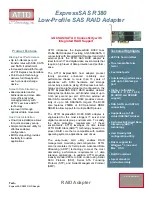
S e n d d o c u m e n t a t i o n c o m m e n t s t o m d s f e e d b a c k - d o c @ c i s c o . c o m
16-3
Cisco MDS 9000 Family CLI Configuration Guide
OL-16184-01, Cisco MDS SAN-OS Release 3.x
Chapter 16 Configuring PortChannels
About PortChannels
•
If you execute the
write erase
command on a 32-port switching module, and then copy a saved
configuration to the switch from a text file that contains the
no system default switchport
shutdown
command, you need to copy the text file to the switch again for the E ports to come up
without manual configuration.
•
Any (or all) full line rate port(s) in the Cisco MDS 9100 Series can be included in a PortChannel.
•
The host-optimized ports in the Cisco MDS 9100 Series are subject to the same PortChannel rules
as 32-port switching modules—only the first port of each group of 4 ports is included in a
PortChannel.
–
You can configure only the first port in each 4-port group (for example, the first port in ports
1–4, the fifth port in ports 5–8, and so on) as an E port. If the first port in the group is configured
as a PortChannel, the other three ports in each group (ports 2–4, 6–8, and so on) are not usable
and remain in the shutdown state.
–
If any of the other three ports are configured in a no shutdown state, you cannot configure the
first port to be a PortChannel. The other three ports continue to remain in a no shutdown state.
Note
In the Cisco MDS 9100 Series, the left most groups of ports outlined in white (4 ports in the Cisco MDS
9120 Switch and 8 ports in the Cisco MDS 9140 Switch) are full line rate like the 16-port switching
module. The other ports (16 ports in the Cisco MDS 9120 Switch and 32 ports in the Cisco MDS 9140
Switch) are host-optimized like the 32-port switching module. Each group of 4 host-optimized ports
have the same rules as for the 32-port switching module.
About PortChanneling and Trunking
Trunking is a commonly used storage industry term. However, the Cisco SAN-OS software and switches
in the Cisco MDS 9000 Family implement trunking and PortChanneling as follows:
•
PortChanneling enables several physical links to be combined into one aggregated logical link.
•
Trunking enables a link transmitting frames in the EISL format to carry (trunk) multiple VSAN
traffic. When trunking is operational on an E port, that E port becomes a TE port. A TE port is
specific to switches in the Cisco MDS 9000 Family. An industry standard E port can link to other
vendor switches and is referred to as a nontrunking interface (see
Figure 16-2
and
Figure 16-3
).
See
Chapter 15, “Configuring Trunking,”
for information on trunked interfaces.
Figure 16-2
Trunking Only
PortChanneling and trunking are used separately across an ISL:
Switch 1
Any other
switch
ISL
E port
E port
Switch 1
Switch 2
EISL
TE port
TE port
Trunking
79938
















































